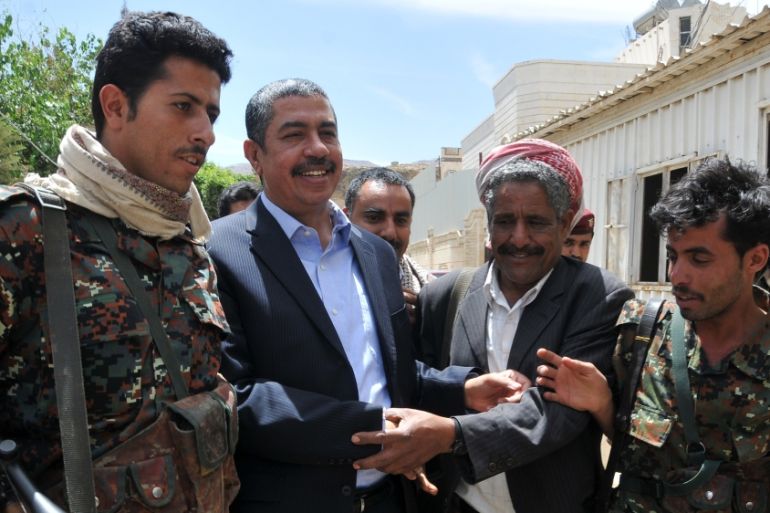Analysis: The man who could save Yemen
Khaled Bahah’s appointment as vice president is the first step towards a political solution in war-torn Yemen.

Former Yemeni Prime Minister Khaled Bahah’s appointment as vice president on Sunday indicates that Saudi Arabia may have realised President Abd-Rabbu Mansour Hadi is actually part of the problem, rather than the solution.
By pressuring Hadi to name a vice president at this critical time, the kingdom may be indicating its political plans for Yemen after the end of its military operation. It is also possible that Bahah will become the de facto president of Yemen, especially since he is popular among broader segments of the Yemeni population than Hadi.
Bahah was the only politician accepted by both the Houthis and former President Ali Abdullah Saleh’s party to become Yemen’s prime minister after the infamous January 2015 agreement of peace and partnership between Hadi, the Houthis, and other key Yemeni political actors.
ANALYSIS: Boots on the ground in Yemen? Think again
For the past three years, Hadi ruled as elected president of Yemen’s transitional government without a vice president, relying on a group of weak advisers with no clear political vision to lead the country. The lack of a vice president exacerbated the ongoing political and constitutional crisis in Yemen when Hadi temporarily resigned during his short-lived house arrest imposed by the Houthis.
Later, Hadi’s escape to Aden and his subsequent relocation to Saudi Arabia to help coordinate the Decisive Storm offensive, again raised the question of whether a vice president is needed. Thus, Hadi’s recent decision to appoint Bahah as his vice president was not surprising.
Yemen is unlikely to become another Syria, Iraq or Somalia. In all of Yemen's past civil wars ... certain forms of political reconciliation have been achieved that are rarely successful in other countries.
Furthermore, Bahah was the only top political leader who was released by the Houthis rather than escaping their control, suggesting the Houthis were not threatened by his discharge. Bahah once served as minister of oil, and later as ambassador to Canada, under the leadership of Saleh. Bahah is from the southern province of Hadramut, and will likely protect the political union between the north and the south.
Consequently, it could be argued that Bahah’s appointment represents a first step towards political compromise in Yemen by pushing aside Hadi. The move also sends a strong message to the Houthis and Saleh’s loyalists that while the kingdom is extremely serious about restoring security in Yemen and ending the Houthi-Saleh military control, the Saudis still hope to achieve a robust political solution.
The question is whether Yemen can avoid becoming a failed state and experiencing a bloody civil war. The guardedly optimistic answer could be “yes”.
Yemen has always possessed exceptional political and social survival skills. Despite being a poor Arab state, it has been rich in terms of its culture and traditions of conflict resolution and political mediation. This is not the first time that the Yemenis have found their country torn by conflict and responded by looking for political solutions.
Despite the ongoing air strikes and rising number of civilian casualties, Yemen has never experienced circumstances such as massive starvation or tragic genocide. Even when the Houthis entered Sanaa in September 2014, they did not behave like most rebel groups in developing countries experiencing military conflict or civil war.
Yemen is unlikely to become another Syria, Iraq or Somalia. In all of Yemen’s past civil wars, from the 1960s to the 1990s, certain forms of political reconciliation have been achieved that are rarely successful in other countries. Political and military enmity is never permanent in Yemen.
At this juncture, Saudi Arabia must understand that both the Houthis and Saleh’s loyalists are important political actors that cannot be eliminated from the Yemeni political context. This does not mean that Saleh, his sons and nephews, and Abdel-Malik al-Houthi should be included as part of any future political formula. There is widespread anger against them and while their absence from Yemen’s political leadership could be important, their followers and affiliated political organisations such as Saleh’s General People’s Congress (GPC) should definitely be included in any future political processes.
The end of the current war in Yemen may occur more quickly and at a lower cost than anyone would ever have expected.